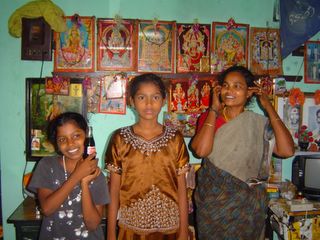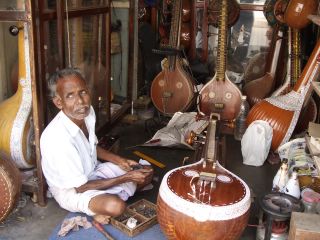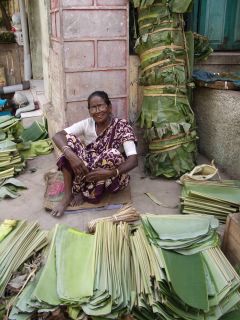The fruit-seller near my house, whose picture stands above (I'd also mentioned her in the Piece of Cloth post below) invited me to her house for lunch one day last month. It was definitely a highlight of Chennai-times. Here's the scoop:
*********
At 11 sharp, Murali, her 15 year old son (and the subject of one of
Rahul's posts) rang my doorbell to pick me up. We walked towards their home, and I asked about his exams. “Science only is left”, he said. What did he want to do after 12
th? “College”, he said matter-of-factly. And after that? “Computer-job” was the confident reply. Did he have a computer at school? Vigorously nodding, he said that there was in fact, a computer in his corporation (government) school.
By this point, we were nearly at the entrance of their compound, and I quickly navigated my way through the intense alley-way cricket match, watchful for any stray cricket balls whizzing past my head. People, life, dogs, vegetables, kodoms, vigorous water-pumping…it was a cacophony of strident smells, sounds and randomness, but it felt alive, and warm.
We walked upstairs and I saw the tiny, one-roomed apartment had been swept meticulously for the occasion. Kamatchi (the fruit-seller's niece), her lustrous black hair fully-oiled and in a tight bun, face covered with some kind of a mud mask, came out in the suit I had given her. She looked stunning. Another’s riches indeed…She graciously asked me to sit down, and I could see the food carefully placed in the vessels next to the seating-mat she had placed for me on the floor. Clearly, she had made preparations for my arrival. I continued standing, taking in the life exuding from the walls of the 8 by 4 foot space. One wall was covered entirely with neon-lit photos of gods, to its corner was a collection of family photos, each one precious and carefully kept. She entreated me to take a seat, and I sat down, genuinely feeling comfortable and warm in the presence of such hospitality. She brought out a set of three leaf plates, and slightly apologetically, asked if it was okay that we ate on those. I quickly assuaged her fears, and she took mine aside, gave it a quick rinse and set it on the floor in front of me. In a second, she had stepped into the kitchen and brought out a bowl and a tumbler with water. She asked if I would wash my hands, and as I stood up to go wash it, she indicated that she had brought out the bowl for that purpose. Her thoughtfulness blew me away yet again. She poured out a big helping of rice, porriyal and sambar, and brought out 2 apalams. I had to cover the plate completely with my hands, desperately trying to say “poddum!” (enough!); she just continued to give me more, saying that I needed to eat and get healthier. This hospitality, this finesse – from a girl exactly the same age as me.
We began talking, I was curious to hear about her thoughts on marriage and men. She had mentioned to me earlier that by this December, she would definitely be getting married. So why did she want to get married then? “Mother, father, brother – all will be more peaceful then.” But what did she want? She repeated a similar answer, something about how it was the right time, and I realized, that it was really just that. I don’t think she even thought about possibilities otherwise. Did she like children? Her beautiful, smile again appeared, and she said that she did. Both girls and boys? “Both.” What about love marriage, what did she think of that? With the look of distaste that only Indians can express (it’s like – the face you make when you encounter a big, white slimy slug) she said, “love marriage I don’t like. Here, many are having love marriages, but in village only few. Here the men will say they love and marry, but then they will leave the woman.” What did she want in a man? Her answer was delivered with a shy smile, with the hint of a blush, “Drinking, smoking…don’t want. Someone who is honest and good, that is all.” I knew I couldn’t evade her turning the question on to me, and soon she asked. Did I want love or arranged marriage? I was hesitant to tell her that I really didn't know if/when I would get married, so I said I wanted a love marriage, and her eyes opened wide with the flickering of mischief. “What, you want only love marriage, vaa? Now, neeng love pundreenge vaa?” (Now, are you doing love?) I tried to brush off these sorts of questions, but said that marriage would only happen later, I didn’t know right now, but probably 28 or 29. “For us, 28 and all, that is too late.” No preaching, no sermons, no ‘what-the-hell are you talking about’. She understood that we have different ways of living. This was an acceptance of humanity at its best.
But did she want to work? Did she ever go out? What kind of work, she asked quizzically? It was obvious she knew very few unmarried women who worked, and had no idea what kind of a job she could do. A little ruefully, she said that she would want to, but her younger brother and parents were dead-set against it. How did she get to be in this flat, with her aunt, brother and nephews? What did she do here? (6 of them slept in that tiny space). She recounted the story: after her aunt’s husband died, her mother asked her to come out there to help her aunt, who was having a hard time earning an income and taking care of her three sons. So she and her brother (an auto driver) came. She washes the clothes, makes the food and does all the household chores at home. They don’t let her go out too much. And her brother, what about him? “He doesn’t give any money, its chitti who gives it all -- for the food, the gas, the electricity, everything. Sometimes, he gives 10 rupees, but mostly, nothing at all. She’s a good woman, my chitthi, I really like her.”
I had finished with my food about 5 minutes before, and as I looked down at the plate, I realized that an army of ants had already arrived, ready to clear up whatever I couldn’t get at. (I thought about my own complaints about the few ants lying around in some far-flung corner of my apartment..) She again reached over to wash my hands with the tumbler-water. I thanked her profusely, and stood up to walk out. I made as many comments as I could about how wonderful her food was, what a great job she did taking care of them all, and how good she looked. I walked out and said thank you, to which she responded shyly with “thank you, thank you, please come again”, and her 1000-watt smile.
I think of all the dinner invites I’ve received and have given, and I wonder if any have touched me more than this. It’s so true that when truly giving, it doesn’t matter how much you have in your hands or pockets. True giving comes from a place where the waters run far deeper.



